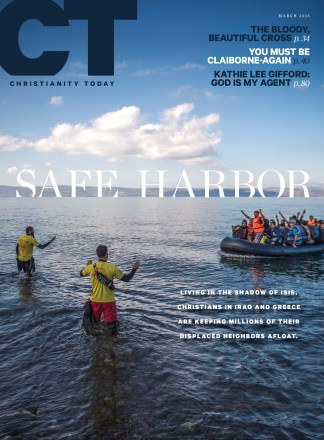Refugees, like the Israelites of the Exodus, sojourn through wilderness and sea to find a land, any land, flowing with the milk and honey of security and freedom. Their journey is a picture of what God is doing in our little lives and in world history: bringing everyone to the distant land where crying and death are no more, where the presence of the Merciful One is palpable.
This ultimate reality weaves together this issue’s two main stories. One is about injustice and mercy—the story of refugees in the Middle East. The other is about evil and mercy—a fresh look at the crucifixion of Jesus Christ. Both assume that we who have been rescued by Jesus Christ are called to the frontlines of God’s merciful work today, though the battle looks different depending on where one fights.
Senior news editor Jeremy Weber’s cover story (page 26) shows us one frontline: the men and women in the exotic countries of Iraq and Greece, giving aid and comfort to those who have just crossed their wilderness and Red Sea.
Another frontline can be seen in the more mundane Wheaton, Illinois, at the humble offices of World Relief, about five minutes from CT. There, women and men, many of them church volunteers from across the county, help refugees find jobs, scour apartment ads, settle their kids into schools, and so much more, so that they might flourish in their new homeland.
Still another front can be witnessed at your local church. There, you will see Jesus’ disciples preaching from a pulpit and teaching in Sunday school and leading a midweek small group Bible study—all to help us grasp the meaning of the Cross. That significance can be put many ways, as theologian Fleming Rutledge reminds us in our interview with her (page 34). But none is more significant than this: that Jesus “won the victory over everything that would destroy us.”
That means whether we’re fighting for justice in the halls of Congress or giving water to the thirsty in the Middle East or teaching fourth graders about God’s love in the suburbs or simply resisting a very personal temptation in our hearts, we are, in the words of Rutledge, “part of a great and mighty cosmic work of God.” Our “little contribution to the battle against Satan and all his works means something.”
The outcome is not in our hands, fortunately. The victory, in fact, has already been secured in the most paradoxical of ways, by the bloody death of the Son of God on the cross. In the meantime, our little efforts, especially when they entail grateful sacrifice, point to the final and complete victory of Christ over evil.
We hardly ever say this so overtly in our pages, but that’s what Christianity Today is ultimately about.









